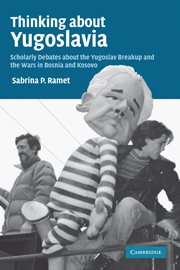 Thinking about Yugoslavia
Thinking about Yugoslavia Book contents
- Frontmatter
- Contents
- Preface
- List of books discussed
- Glossary
- 1 Debates about the war
- 2 The collapse of East European communism
- 3 The roots of the Yugoslav collapse
- 4 Who's to blame, and for what? Rival accounts of the war
- 5 Memoirs and autobiographies
- 6 The scourge of nationalism and the quest for harmony
- 7 Milošević's place in history
- 8 Dilemmas in post-Dayton Bosnia
- 9 Crisis in Kosovo/a (with Angelo Georgakis)
- 10 Debates about intervention
- 11 Lands and peoples: Bosnia, Croatia, Slovenia, Serbia
- 12 Southern republics: Macedonia and Montenegro in contemporary history
- 13 Conclusion: controversies, methodological disputes, and suggested reading
- Index
- References
5 - Memoirs and autobiographies
Published online by Cambridge University Press: 22 September 2009
- Frontmatter
- Contents
- Preface
- List of books discussed
- Glossary
- 1 Debates about the war
- 2 The collapse of East European communism
- 3 The roots of the Yugoslav collapse
- 4 Who's to blame, and for what? Rival accounts of the war
- 5 Memoirs and autobiographies
- 6 The scourge of nationalism and the quest for harmony
- 7 Milošević's place in history
- 8 Dilemmas in post-Dayton Bosnia
- 9 Crisis in Kosovo/a (with Angelo Georgakis)
- 10 Debates about intervention
- 11 Lands and peoples: Bosnia, Croatia, Slovenia, Serbia
- 12 Southern republics: Macedonia and Montenegro in contemporary history
- 13 Conclusion: controversies, methodological disputes, and suggested reading
- Index
- References
Summary
No scholar, as far as I am aware, has ever supported, in any way, the fanciful ‘ancient hatreds’ thesis in any form. But the scholarly literature concerning recent Yugoslav history has not been without its serious lapses – among them, inexplicable tendencies towards occasional Germanophobia, Hobbist tendencies towards the elevation of state sovereignty above the moral law (flaring during discussions of possible Western duty to intervene in Bosnia during 1992–5 and in Kosovo in 1998–9), and moral relativism. These tendencies have, inevitably, affected the way in which facts have been presented.
Thus, the recent flood of memoirs from principals in the Yugoslav drama is especially welcome, insofar as it affords the opportunity to see how the participants themselves would like their roles and actions to be remembered, and provides fresh accounts from inside concerning what may have happened. In the process, readers may test their own theories and interpretations concerning the breakup and war against first-hand recollections.
Among the first memoirs published were those by former president of the SFRY (Socialist Federated Republic of Yugoslavia) Presidency (May–October 1991) Stipe Mesić, former SFRY defence minister (May 1988–January 1992) Veljko Kadijević, former president of the SFRY Presidency (May 1990–May 1991) Borisav Jović, former EU mediator David Lord Owen (discussed in chapter 4), and former US ambassador to Yugoslavia Warren Zimmermann (also discussed in chapter 4).
Information
- Type
- Chapter
- Information
- Thinking about YugoslaviaScholarly Debates about the Yugoslav Breakup and the Wars in Bosnia and Kosovo, pp. 108 - 137Publisher: Cambridge University PressPrint publication year: 2005